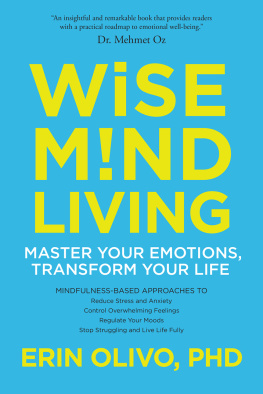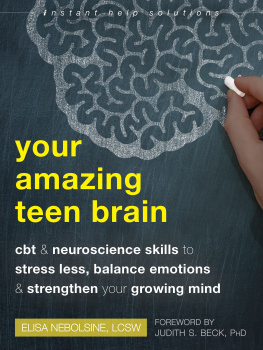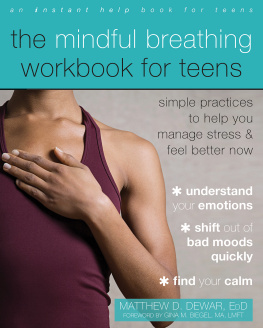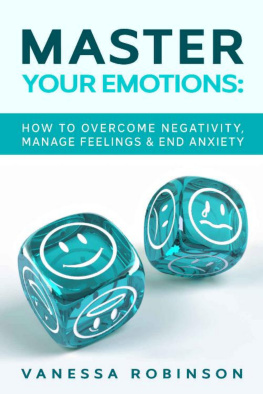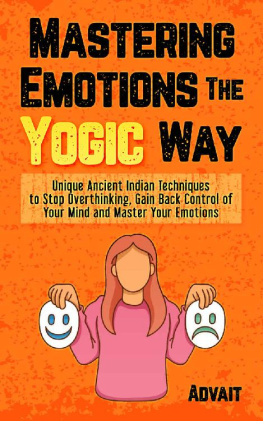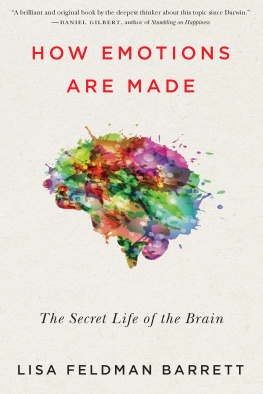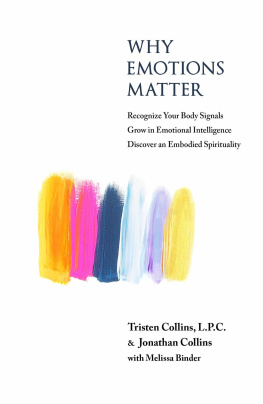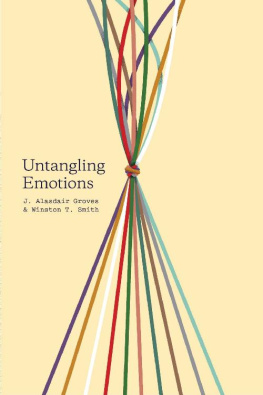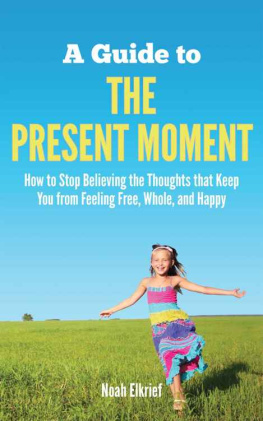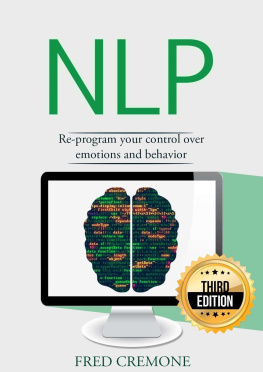
This book is dedicated to my patients, who inspire me each and every day with the courage and vulnerability they bring to the process of therapy. They show me that transformation truly is possible. I am honored to be a part of their lives.
Contents
What Good Are My Emotions?
The Good in the Bad and the Bad in the Good
Acknowledgments
I am so grateful to the many people who helped make this book a reality, supporting and encouraging me and sharing their wisdom throughout the process.
First and foremost, I want to thank my mentor, Mehmet Oz, for his ongoing guidance and friendship. This book literally would not exist if not for his wise counsel and generosity. It was a specific conversation with him that inspired me to become an author and set this book in motion, and many conversations since have helped bring it to fruition.
I am also profoundly grateful for two incredible women who helped me every step of the way. Colleen Kapkleins wonderful writing and organizational talents made this a better book, and working with her made the writing process so much more enjoyable. Deborah Strafellas tenacity, great taste, and commitment to always creating something excellent constantly amaze me, and I am so grateful for her friendship and collaboration.
I couldnt have a found a better home for this book than at Sounds True. I offer my sincerest thanks to everyone in the Sounds True family for their unwavering support. I want to specifically thank Tami Simon for her visionary leadership, Nancy Smith for her nurturing presence, Haven Iverson and Leslie Brown for their invaluable guidance, and Mitchell Klute for his insightful direction of my audio book.
I am very fortunate to have been taught by many wise and inspiring mentors throughout my career. I am indebted to Marsha Linehan, whose groundbreaking work provides the foundation for how I practice as a psychotherapist and how I teach Wise Mind Living. I am deeply grateful for the guidance of my former professors and supervisors Kim Lehnert, Christine Foertsch, Lisa Miller, Xavier Amador, and Richard Sloan. For my introduction to and ever-evolving understanding of spiritual and contemplative practice, I remain forever indebted to the wisdom and teachings of Robert Thurman, Joseph Loizzo, and Jon Kabat-Zinn.
I am also incredibly lucky to have an amazing group of colleagues and friends who assist and collaborate with me in my clinical practice and who buoyed me through the challenges of writing this book. My deepest thanks to Julie Nathan, Cecilia Dintino, Hannah Starobin, Gina Pulice, and Mark Wilson for helping me live and practice in Wise Mind, and to my dear friends Katherine Johnson, Stephanie Martin, Rachel Gotler, and Melissa Stewart for being there with reassurance and practical support during moments of Emotion Mind.
My parents were the first people to show me what Wise Mind Living truly means, and they introduced me to the concepts of dialectical behavior therapy without even knowing it. I am so deeply grateful that from the very beginning of my life they taught me how to acknowledge, honor, and master my emotions. They did so both directly and by the example they set in how they live their lives. I wouldnt be who I am without their love, wisdom, and firm foundation.
And lastly, I want to thank my husband and my son for the joy and meaning they bring to my life, and for showing me the full scope and magnitude the emotion of love can reach! I love you both more than I ever dreamed was possible.
1
WISE MIND VS. EMOTION MIND
Stress, Emotions, Health, and Happiness
S o, how are you? If I had to guess your answer, Id go with, Im so stressed out! You might even feel like your stress is never-ending; I hear this from new patients all the time. When they describe what is going wrong for them, they refer to it as stress. But by that, they could mean theyre experiencing a bad mood, aches and pains, relationship conflict, or pretty much anything that simply is not going their way. Or they might be referring to overscheduling, overspending, or overexercising. Or lack of exercise or sleep. Or eating too much. Or not eating enough. Im so stressed out! might reflect an inability to say no or a major life transition or serious trauma. Or a microtrauma (I forgot my lunch!).
No matter what is going on with us, we tend to think of ourselves as being under stress. And so we are. But its not the stress per se that we most need to deal with to improve our lives. These days, we cant wade two inches deep into the media without being splashed with advice on how to beat, reduce, or avoid stressas if that were the very thing we need in order to find happiness, reach our full potential, or otherwise live the lives we dream of. If only I could get rid of this stress!
We live in a culture that is very efficient at generating stressors (thanks, smartphone) and that, at the same time, makes stress reduction seem like an urgent task at which we are all failing to measure up. The way we think about stress stresses us out! But when we identify stress as our main problem in this way, when we target stress busting as the way to improve our lives, we make a fundamental error in thinking. If we only focus on the stress that our problems are causing or on the problems themselves, nothing will change. If we really want to make a difference for ourselves and our health, if we want to free ourselves from our issues, whatever they may be, we need to focus our attention on the emotions underlying these problems. These emotionsunmanaged and unmasteredare not only causing the problems; they are also creating the stress.
If we want to manage our stress, we have to manage our emotions. If we want to manage our lives, we have to manage our emotions!
Our stress and our problems both stem from emotions that are being overlooked, ignored, denied, misunderstood, misinterpreted, suppressed, or just generally poorly handled. We might pin the blame on the boss or our kids, on having too little time or too much to do, or on any number of other things. But underneath that, the real troublemakers are our feelings about those things and how we manage those feelings. Our distressing emotions, when they arent being taken care of in a productive way, are at the root of all of our most common issues, including overeating, chronic relationship conflict, money mismanagement, substance abuse, and even, in many cases, poor physical health.
So, as you can see, when you get a handle on your emotions, youll get a handle on your problemsand your stress. Then you will be able to effect a top-to-bottom change in every aspect of your life through the choices you make every day: master your emotionstransform your life.
LIVING IN WISE MIND
Tara Is Really Stressing
Tara thought her life had been pretty well transformed already when she gave birth to her daughter. She wasnt really in the market for any more big changes, thank you very much. But the baby was two months old now, and Tara was really stressing about whether she should go back to work. She was lucky enough to have three months of maternity leave from her teaching job, but she was down to the last few weeks of it, and the school was expecting her back. If only she could get some sleep, Tara told me, maybe she wouldnt be freaking out about this; but it seemed like it was all she could think about. How could she go back to a class full of chemistry students when she was nursing her baby every two hours? How could she leave her tiny, precious daughter in the hands of those
Next page
